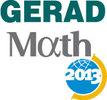HEC Montréal, Canada, May 6 - 8, 2013
2013 Optimization Days
HEC Montréal, Canada, 6 — 8 May 2013
OPDE 2013 Call for papers
Conference theme: “Operation research tools, tools among others to decide together”.
Falling under the previous editions, this conference of the “Tools for Group Decision” network (Outils Pour Décider Ensemble, OPDE) aims to review the current state-of-the-art and recent researches related to the collective decision and decision aid. The prevailing rationale of the network and its related conferences is to exchange and compare reflections and experiences by focusing on the diversity of points of views, contexts, and scientific horizons. Let us remind that the definition of tool notion is willingly largely open. This year, the operation research tools are more specifically highlighted but not in a limitative way.
If the need for “deciding together” appears more and more required, the questions of “who” and “how” are still highly challenging. The questions of the decision object and the problem setting may require also debates and discussions. According to theoretical postulates, linear or iterative approaches, processes expertise, qualitative or quantitative data usage (or both) could be examined as well as the relative importance given to the rational argumentation structure or other influences, etc. The matter of values is also an important issue. If it is easy to understand that the different actors of “deciding together” may have different value systems potentially conflicting, it is far more difficult to incorporate them in the methodologies, tools, and processes used for making decision. Sometimes, the matter of values is openly addressed but the lack of realism of some approaches appears weakly efficient for solving conflict value. The “deciding together” requires an integrated reflection about tools, contexts, procedures and processes.
As an example, the systematic use of quantitative decision aid tools in order to design, implement or assess public policies, known as “policy analytics” offers to rethink about this integrating framework. This consists in the development of information provided by: existing operation research expertise, decision aid, statistics, innovative modelling, NTIC, data mining, collaborative and deliberative decisional processes, (…); useful for public policy design.
There is also the matter of scales: decisional levels (policies, plans, programs, projects, and measures); administrative frameworks (Internationals, nationals, regionals, and locals); geographical scales (territories at different level of perception); temporal horizons (short, medium and long terms); social organisation scales (institutions, groups, families, individuals).
Overall, operation research brings a lot to the decision aid. It allows, in particular treating complex problems and dealing with a huge amount of data. It could be also used in combination with other tools. Thus, the NTIC brings new challenges in particular by multiplying discussion platforms (e.g. role of the social networks and the Web 2.0 tools…) and by making accessible a large amount of data. How to select those which are relevant among so many data available?
How can we organize all those kind of tools within the “deciding together” framework?
What kind of contribution they bring? What are the “right tools” and the “right combination of tools” (over the instrumentation)? Is there any consistency problems?
Tools and procedures are multiplying and are still under researches. Multiple experiences are done sometime successfully and sometime not. Whether you are, professor, student, professional, expert, civil servant or consultant, we thank you for bringing your own contribution to all this kind of questions and others missed here but you find important.
Type of contributions:
Communications selected should preferably fall under one the following themes:
- Public decision making (at various levels) related to urban and regional planning; environment and natural resources management;
- Investments or projects selection processes (implementation, R&D…);
- Decision making within various type of networks (clusters, pools…);
- Pre-project phases, exploration partnerships, targeted markets, upstream phases of design processes;
- Designing firms' strategic options;
- Budget projects planning;
- Emergency situations, mutual adjustments or collective coordination in “real time”;
- Specific situation related to tools and procedures of the “deciding together” within some management fields, within or between different organisations: marketing, finance, human resources management, information system, accounting, management accounting, project management, etc.

